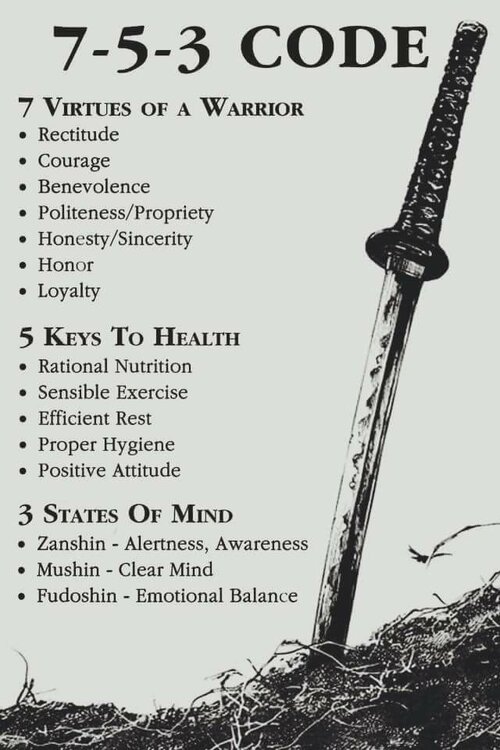Jiu Jitsu Philosophy
The 753 Code
Development of Character
Improving one’s character is hard work. Just as a Jiu Jitsu practitioner should approach their technical development with some intentionality, character needs deliberate effort in order to develop to the full extent. Today, many are willing to compromise their character for the sake of likes or followers on social media. They seek popularity and try to capitalize on it at all costs, instead of trying to do the right thing and being an example for those around them. However, we believe that character development is an important aspect of reaching one’s potential as a martial artist and a human being. Not to mention that everyone around you will benefit if you refine your character.
The idea that martial artists need to hold themselves to a higher ethical and moral code has been around for a long time. The seven virtues of a warrior in 7-5-3 code are derived from the Bushido code of the Samurai warriors. The Bushido code strongly influenced and still permeates the Japanese culture.
Japanese Samurai were required to observe this moral code known as “Bushido.” Bushido is literally translated as the way of the warrior.
So What Exactly is the 7-5-3 Code?

The code is comprised of 7 virtues of a warrior, 5 keys to health, and 3 states of mind. These provide guidelines as well as goals for self-improvement. For instance, a year from now you should be wiser, more patient, more virtuous human being. You should work on your health, as well as ability to clear your mind, maintain emotional balance and focus.
Every Jiu Jitsu practitioner should constantly work on growing in the seven virtues (yes, all seven, you don’t get to choose). Your approach to health will have a profound impact on your Jiu Jitsu as well as the overall quality of your life. As such, the code contains five keys to great health. Finally, there are different states of mind that a fighter needs to master in order to be the best Jiu Jitsu practitioner they can be.
Definitions of the 7 Virtues of a Warrior
1) Rectitude – morally correct thinking and behavior. It is simply the willingness to do the right thing regardless of consequences.
2) Courage – ability to do something in the face of fear. It is the inner strength to face fear or resist opposition.
3) Benevolence – a disposition to be kind and to do good.
4) Politeness/propriety – intentional consideration and courtesy towards people around you and the situation at hand. This means treating others with respect.
5) Honesty/sincerity –only telling the truth to yourself and people around you. A genuine integrity in character and action.
6) Honor – To have honor for someone is to have profound respect and reverence towards them. To have honor yourself is to hold yourself to a high ethical standard. If you break that ethical standard, you lose honor.
7) Loyalty – faithfulness in relationships and alliance.
Notes on the 5 Keys to Health.
1) Rational nutrition – You don’t have to be on a strictest or the newest diet. However, if 85 percent of the food you consume is not healthy, you will eventually pay a price for your lifestyle choices. On the other hand, if 85 or 90 percent of the diet you consume is healthy, in the long run, you will reap the benefits.
2) Sensible exercise – This implies a balance. Everyone needs some exercise (perhaps at least a few times a week). However, avoid overtraining as it will also lead to health problems. When trying to get in shape pursue longevity as opposed to fast results. This will require the exercise of patience.
3) Efficient rest – Rest is just as important as exercise is. Do not neglect it.
4) Proper hygiene – in the context of Jiu Jitsu, this means washing your Gi, or other training clothes after every single practice, showering before each practice, making sure your nails are properly trimmed, and making sure you take a thorough shower as soon as you can after practice.
5) Positive attitude – Your mind has a tremendous impact on your development and performance. Take conscious effort to recharge and make sure that you are maintaining a positive attitude.
Definitions and Notes on the 3 States of Mind.
1) Zanshin — This means awareness, alertness, and readiness. This means being prepared 24/7. Unlike a boxer, who may train for three months to prepare and get his body ready for a fight, Jiu Jitsu practitioner has no off-season. You never know when you might need to use your Jiu Jitsu. As such, you should be always prepared. Jiu Jitsu is a lifestyle. It is important to develop an ability to focus so that during a fight you can solve specific problems in front of you.
2) Mushin — Literally translated as “no mind.” With too much on one’s mind, a fighter can not react properly to situations in front of them. As such, it is important to be able to clear one’s mind. During a fight this might mean clearing one’s mind of the adversity just faced or mistakes just made and focusing on problems at hand.
3) Fudoshin — This means a “state of emotional balance.” To achieve this balance means to control variations in your emotions. There should not be big ups and downs. During a fight this means controlling both positive and negative emotions. For instance, you must control fear in order to react in an optimal manner, but you must also control excitement in order to avoid reckless mistakes.

